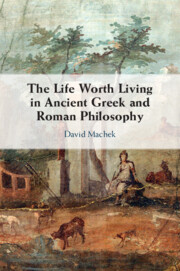Book contents
- The Life Worth Living in Ancient Greek and Roman Philosophy
- The Life Worth Living in Ancient Greek and Roman Philosophy
- Copyright page
- Dedication
- Epigraph
- Contents
- Acknowledgements
- Abbreviations
- Introduction
- Chapter 1 Plato on Making Life Worth Living by Doing One’s Job
- Chapter 2 Aristotle on the Natural Goodness of Life
- Chapter 3 Decoupling Happy Life from Life Worth Living in Stoicism
- Chapter 4 Threshold Nears the Target: Hellenistic Hedonists on the Life Worth Living
- Chapter 5 Peripatetics on Vicious Humans and Caged Animals
- Chapter 6 Plotinus on the Worth of Embodied Existence
- Conclusions
- Bibliography
- Index Locorum
- Subject Index
Chapter 6 - Plotinus on the Worth of Embodied Existence
Published online by Cambridge University Press: 29 April 2023
- The Life Worth Living in Ancient Greek and Roman Philosophy
- The Life Worth Living in Ancient Greek and Roman Philosophy
- Copyright page
- Dedication
- Epigraph
- Contents
- Acknowledgements
- Abbreviations
- Introduction
- Chapter 1 Plato on Making Life Worth Living by Doing One’s Job
- Chapter 2 Aristotle on the Natural Goodness of Life
- Chapter 3 Decoupling Happy Life from Life Worth Living in Stoicism
- Chapter 4 Threshold Nears the Target: Hellenistic Hedonists on the Life Worth Living
- Chapter 5 Peripatetics on Vicious Humans and Caged Animals
- Chapter 6 Plotinus on the Worth of Embodied Existence
- Conclusions
- Bibliography
- Index Locorum
- Subject Index
Summary
This chapter focuses on Neoplatonist engagements with the issue of life worth living as represented in the philosophy of Plotinus. The Platonic metaphysics and ethics regards the highest form of life as the life of pure intellection, and the materiality of the body in strongly negative terms as the limiting and potentially corrupting influence on the soul. Therefore, the question about the conditions of a life worth living emerges specifically as a question about the worth of embodied life. Is it worthwhile for the immortal soul to descend into bodies, and to remain there until the bond between body and soul dissolves naturally? Plotinus’s attempts to answer this questions are best viewed in terms of a negotiation between the anti-corporealist stance, according to which disembodied existence is always better for the soul, and an acknowledgment that the embodied condition is good for the soul, insofar as it enables the realisation of some of its capacities.
- Type
- Chapter
- Information
- The Life Worth Living in Ancient Greek and Roman Philosophy , pp. 195 - 223Publisher: Cambridge University PressPrint publication year: 2023

